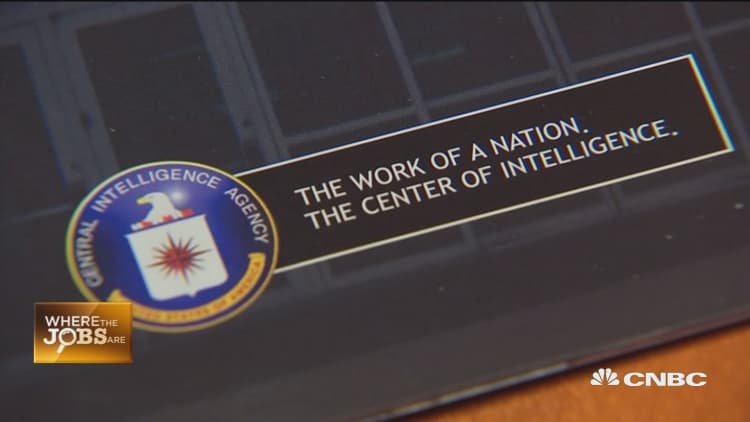
For 25 years, Zachary Wyatt worked as a CIA operations officer tasked with acquiring foreign sources around the world to gather information essential to U.S. national security and foreign policy objectives.
Today, Wyatt, who is now retired from the CIA, works to help the agency find its next generation of talent.
From analysts to accountants to lawyers and foreign language instructors, the CIA is looking to fill 100 professional positions across its five directorates — operations, analysis, science & technology, support and digital innovation. Wyatt says the most proactive recruitment efforts are in operations, which handles the clandestine work.
"We're fortunate to get a steady stream of applicants, but that's not to say we're not constantly looking for more," Wyatt said. "When you look at the national security challenges we have and combine that with the challenges that face any country today — regional instability, cyberattacks, economic interdependence — finding individuals who can address any of them is not easy."
To apply, one must be at least 18 years old and a U.S. citizen, born or naturalized. Most roles within the agency also require a four-year degree. Beyond that, applicants can come from nearly any background; Wyatt himself was a theater major before joining the CIA; but having an interest in foreign affairs and current events is essential. The process is lengthy, and it can take a year or more to get security clearance, Wyatt said.
"We look for characteristics that many employers do — everything from excellent communication skills, integrity, decisiveness, good judgment, common sense and certainly patriotism," he said.
Entry-level salaries within the Directorate of Operations typically range from $55,000 to $88,000 annually, and training is extensive, Wyatt said.
The agency recruits from veterans groups, military bases and schools that run the gamut from local colleges to Ivy League universities. Among them is the Georgetown University School of Foreign Service, where Anne Steen is executive director of the school's Graduate Career Center. Student interest in the intelligence field has continued to grow, as many study political science, economics and languages, Steen said. Agencies such as the CIA, the FBI and the State Department come to campus to look for new potential hires.
"We have global thinkers in Georgetown. … They are attractive to the intel community in both the public and private sectors," she said. "There are elements to intelligence that didn't even exist 10 years ago whether its cyber or artificial intelligence, and our students are on the cutting edge."
A common theme among students who want to pursue careers in intelligence is a desire to serve.
"They're students who want to make the world a better place," she said. "I think our students are value-driven and they're very interested in public service or in serving the country and making it safer — they're driven by the mission of the organization."
William Bilicic, 20, is one student at Georgetown who feels compelled to serve in some capacity. He's a sophomore studying international politics and security, minoring in French. Working as an analyst for the CIA or another agency in the intelligence field is among his top career interests.
"We've got all of these great public servants doing amazing work each day just to keep our country safe, and keep everyone here and abroad safe. That's what really attracted me to that field," he said.
Steen cautions students like Bilicic who are aiming to work in intel roles that the competition is steep and the application process is often long.
"Students that put themselves out there need to understand that they have to have all of their ducks in a row, and put their best case forward," she said. "There are thousands of applications for these positions."
And the work isn't for everyone. Wyatt says it's also not what you see in Hollywood movies.
"When you combine what we're looking for — that is an interest in public service, not needing public recognition for your successes, not being able to share some of your successes with the people you most love and respect — that is a sacrifice and it's a lifestyle. We are mission-driven, and people have to realize that coming in."


